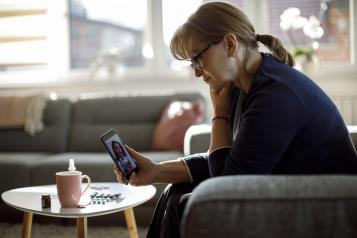Hertfordshire residents reveal serious gambling harms

It was recently reported in the Gambling Survey for Great Britain that the scale of harm caused by gambling could be eight times higher than previously thought, with an estimated 1.3 million adults having struggled with ‘problem gambling’.
Our Gambling Harms Strategy: Feedback from those with Lived Experience Report showed that many of those in Hertfordshire who contributed to the research were oblivious to their addiction until it was too late and substantial damage had been caused to their relationships, livelihood, finances and mental health.
Why was this research done?
Hertfordshire County Council’s Public Health team and the Hertfordshire Gambling Harms Alliance are drafting a Gambling Harms Strategy. They wanted ‘experts by experience’ involved in the early stages of this, so their views could be used to identify the priorities and actions required to reduce gambling harms in Hertfordshire.
Hertfordshire County Council, Public Health and Viewpoint heard from Hertfordshire residents aged 18 years and over, who had experienced the harms caused by gambling (their own or somebody else’s).
Focus groups for residents were held in May and June 2024. This engagement was transcribed and analysed by Healthwatch Hertfordshire.
What did people say?
Look out for hidden signs of gambling addiction
Participants made it clear that anyone could be susceptible to gambling harms and it was often not considered as dangerous as other forms of addiction, such as drug or alcohol use. They suggested this could be because gambling is much easier to conceal, so public awareness is far lower than other, more visible, addictions.
It was suggested a “spot the signs” list should be produced to help people potentially detect the silent signs of gambling.
“I think creating a ‘spot the signs’ – it was only when he started avoiding taking part in family stuff that alarm bells started ringing.”
“A lot of it is done behind closed doors now because of social media. You can go on your phone, and you can bet for as long as you want and no one around you will ever know about it, it can just go undetected, whereas with alcohol it doesn’t.”
Children and young people
It was recognised that gambling is now far more accessible to young people with online gambling and is often glamourised – meaning they do not see the devastating reality of gambling harms. Participants suggested that younger generations may be more predisposed to gambling addictions, with children’s games asking users to spend money to level up or earn more rewards, which normalises gambling.
It was also emphasised that young people are more likely to be the ones that have to deal with the consequences of gambling. Children are often particularly impacted by gambling, due to behavioural changes in their parent(s) and less disposable income available. Participants suggested that schools could play a role in spotting potential signs of gambling in families to safeguard children and to provide access to counselling should they be affected.
“Make sure it is part of the addictions package that is delivered at schools which is currently very alcohol and drugs focused.”
“It’s difficult because you don’t want to pry into people’s private lives but if a kid can’t go on the trip or the parents are struggling to replace uniform, that’s another potential sign that professionals can spot.”
Tighter rules, regulations and advertising restrictions
Participants felt the level and intensity of advertising was highly inappropriate and ‘triggering’ for those at risk of, or experiencing, gambling harms and added that ‘safer gambling’ messages in advertisements were not an effective deterrent.
In this context, they said that ensuring licensing and regulations were more restrictive should be the first priority listed in the Gambling Harms Strategy. They added that the Government should do more in terms of lobbying, changing attitudes and regulating gambling.
“You’re just bombarded with it. Turn on the TV … and it’s a Tombola advert – they’re just everywhere. Sometimes on sports when you watch it, it’s every advert, and it’s going to trigger you. I think it’s just bad.”
“When you’re in active addiction you’re not having fun, you’re seeking the win, getting the dopamine hit you need, you’re not going to take any notice of that tiny little writing at the bottom.”
Help to stop gambling is flawed
People who want to stop gambling can ‘self-exclude’ from gaming websites, locations and organisations. However, participants said the system was terrible and they wanted a single database from which all sites and companies could be blocked instantly, with no ability for organisations to contact them in the future.
One person said that in order to exclude themselves from arcades and adult gambling centres, they had to visit each establishment in-person, as it was not possible to exclude from multiple sites at once. They described the process as ‘disgusting and triggering’.
“There should be some way as soon as you put somewhere that you are a compulsive gambler that you shouldn’t be able to get any text messages because I’ve had probably about 25 in the last month offering slots and stuff, I just delete them but it’s terrible. It doesn’t stop. I had a casino call me the other day, cold call me.”
“The process to self-exclude is bonkers and it’s the equivalent to asking a drug addict to walk into the house of their drug dealer and say to them ‘I don’t want to take drugs anymore’.”
Health
Many participants said they did not know who to contact or where to go for support. To alleviate the fear of stigma and shame, they also emphasised the importance of receiving anonymous and/or online support to protect their identity
It was suggested that GPs should provide more help in terms of mental health, given the impact gambling can have on an individual’s emotional wellbeing.
“Health professionals should view gambling in the same way as they might for alcohol and substance misuse. It doesn’t feel like professionals have the same level of understanding or sympathy around gambling.”
“My GP knew the amount that my gambling had impacted my situation, so they made a referral and set up some counselling.”
What happens now?
Participants commented that gambling is often seen as simply “harmless fun” and have called for increased awareness of gambling harms.
Influencing the licensing and regulatory environment was the most important priority for participants, who called for far greater restrictions in advertising, gambling establishments and online gambling. They emphasised the need for self-exclusion to be made easier to protect people from gambling harms.
The provision of effective treatment and support was important to participants and they emphasised that awareness of local services needed to be improved. They supported a proposal for the NHS and voluntary sector to play a greater role in helping those at risk of, or experiencing, gambling harms. Participants also emphasised the need to ensure support for affected family and friends.
The Public Health team at Hertfordshire County Council will address these findings in the Gambling Harms Strategy and ensure it reflects the needs and priorities of those with lived experience.
Hertfordshire County Council has now opened its wider consultation about the Gambling Harms Strategy for Hertfordshire (until 22 Sept 2024) and you can provide feedback here: Gambling Harms Strategy Consultation
In the UK, support for problem gambling can be found via:
- NHS National Problem Gambling Clinic or 020 7381 7722
- Local East of England Gambling Service or 01908 724287
- Gamblers Anonymous or 0330 094 0322
- GamCare or 0808 8020 133


